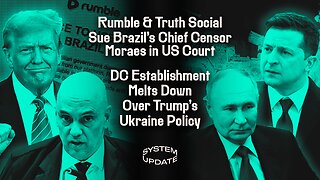Premium Only Content

Episode 1366: Assisting in breaking immigration laws is not Catholic or Charitable
This is a topic I need to bring up and clarify. We as Catholics always turn to the Church for guidance on civil matters to be assured we are not serving the City of Man but rather the City of God as St Augustine would say. We should never take a position that is opposite of Church teaching. Never. So when we get Catholic politians that intentionally break the laws of God and knowing continue to do it (abortion, homosexuality, divorce and feminism (womens rights) they are sinning against the holy spirit and as Christ said, those sins will not be forgiven.
In Christian theology, the concept of sinning against the Holy Spirit is derived from a passage in the New Testament of the Bible, specifically in the Gospels of Matthew, Mark, and Luke. The specific verse is often referred to as the "unforgivable sin" or the "blasphemy against the Holy Spirit."
In Matthew 12:31-32, Jesus says:
"Therefore I say to you: Every sin and blasphemy shall be forgiven men, but the blasphemy of the Spirit shall not be forgiven. And whosoever shall speak a word against the Son of man, it shall be forgiven him: but he that shall speak against the Holy Ghost, it shall not be forgiven him, neither in this world, nor in the world to come."
In Mark 3:28-29, Jesus says:
"Amen I say to you, that all sins shall be forgiven unto the sons of men, and the blasphemies wherewith they shall blaspheme: But he that shall blaspheme against the Holy Ghost, shall never have forgiveness, but shall be guilty of an everlasting sin."
In Luke 12:10, Jesus says:
"Amen I say to you, that all sins shall be forgiven unto the sons of men, and the blasphemies wherewith they shall blaspheme: But he that shall blaspheme against the Holy Ghost, shall never have forgiveness, but shall be guilty of an everlasting sin."
These passages suggest that while forgiveness is available for most sins and blasphemies, there is one particular sin or blasphemy against the Holy Spirit that will not be forgiven. These passages refer to a persistent and willful rejection of the Holy Spirit's work and influence in one's life.
So when Catholics persist and willfully reject the Church teachings or faith and morals they are willfully rejecting the parchlete that Christ sent to his mystical body the Catholic Church. Its that simple but many modern Catholics today want to bend the Church teachings to their humanistic ideals. It doesn’t work that way and you are only setting the course for your own perdition and trust me that none of the politians and friends will be standing next to you on judgement day You own your persistent and willful rejection.
So you may say “wait walt why did you title this episode “assisting those who break immigration laws is not Catholic”?
Well let’s see what the Catholic Churches position on this is and sadly we can’t follow Pope Francis because he intentionally and persistently works against the teaching of the Church and any Catholic that does have no excuse of due to ignorance. Know your faith.
The Traditional Catholic Church holds that charity is a fundamental aspect of Catholic life. While the Church encourages acts of charity, there are situations where aiding in breaking the law is not allowed. The Church recognizes the importance of respecting civil laws and authorities. Regarding immigration, the Catholic Church generally advocates for the dignity and rights of migrants, emphasizing the importance of treating them with compassion and respect. The Church promotes just and fair immigration laws that prioritize the well-being of individuals and families, particularly those who are fleeing persecution, violence, or extreme poverty. However, the Church does not condone or encourage violation of immigration laws. So what are you to do as a faithful Catholic. There are significant Catholic Charities setup specifically for this purpose so you should donate to these organizations and the Church will handle it the proper way.
Here are some well-known Catholic charities that focus on aiding the poor and immigrants:
Caritas Internationalis: Caritas is a confederation of Catholic charitable organizations operating worldwide. They work to alleviate poverty, promote justice, and support sustainable development. Their initiatives include emergency response, healthcare, education, and livelihood programs.
Catholic Relief Services (CRS): CRS is the official international humanitarian agency of the Catholic community in the United States. They provide assistance to people in need, irrespective of their race, religion, or nationality. CRS focuses on emergency relief, development projects, and advocacy efforts.
Jesuit Refugee Service (JRS): JRS is an international organization that serves and advocates for refugees and forcibly displaced persons. They offer education, livelihood support, healthcare, and psychosocial services. JRS works in collaboration with local churches and communities.
Saint Vincent de Paul Society: The Society of St. Vincent de Paul is an international Catholic lay organization present in many countries. Their volunteers provide direct assistance to individuals and families in need, including financial aid, food, clothing, and other essentials.
Scalabrini International Migration Network (SIMN): SIMN is a global network of Catholic organizations that assist migrants and refugees. They offer services such as legal aid, education, vocational training, and social integration programs.
Catholic Charities USA: Catholic Charities is a national network of charitable organizations in the United States. They provide a wide range of services to individuals and families in need, including the poor, homeless, immigrants, and refugees.
These are just a few examples of Catholic charities that focus on aiding the poor and immigrants. There are numerous other local, regional, and international Catholic organizations dedicated to similar causes.
So if you are approached by illiegal immigrants have cards made out and steer them to an organization. You should never provide money or housing or assistance without knowing their real situation and if they admit they are in the country illegally you should for sure not provide any assistance directly. By doing so you are adding in breaking two laws:
1). Legal immigration
2). Stealing funds of tax payers who have not decided to freely give but are being forced to give.
Remember that facts are never emotional. If someone intentionally comes to the US and breaks the laws they are undermining the civil laws and authorities and then no civil law or authorities can stand.
Now how about all these supposedly homeless people that are at many major interections in the major cities or who roam the streets begging for money.
In cases where scams or fraudulent activities are involved, the Catholic Church unequivocally condemns such actions. The Church promotes honesty, integrity, and respect for the well-being and dignity of all individuals. Engaging in scams or fraudulent practices goes against these principles and is inconsistent with the teachings of the Church.
If you see these scams you simply point them to Catholic or Civil chariyies and do not just hand over money. Once again this just underminds credible poor who are in most need. Provide money to charities and let them distriubite them accordingly. We have so many shelters and food panties operated by the church. I remember myt day providing food to a catholic food bank and they told him that the people are tired of the breads and soup he provides. He stopped providing all together. Today we have a spoiled poor that insist creature conforts are their rights. Nope, you want to get a job. You are doing them no good.
2 Thessalonians 3:10: "For even when we were with you, we would give you this command: If anyone is not willing to work, let him not eat." This verse emphasizes the necessity of work, and the responsibility individuals have to contribute to their own well-being and that of the community.
Ephesians 4:28: "Let the thief no longer steal, but rather let him labor, doing honest work with his own hands, so that he may have something to share with anyone in need." St. Paul emphasizes the transformation of a thief into an honest worker who not only supports himself but also has the ability to help others in need through his labor.
Colossians 3:23-24: "Whatever you do, work heartily, as for the Lord and not for men, knowing that from the Lord you will receive the inheritance as your reward. You are serving the Lord Christ." This passage highlights the idea that work should be done with enthusiasm and dedication, considering it as a service to God rather than merely a means of pleasing people.
St. Paul's teachings on work emphasize the dignity of labor and the responsibility to contribute to society through honest and diligent work. He encourages believers to approach their work with integrity, generosity, and a recognition of the spiritual dimension of their efforts.
Knowing I use St Thomas Aquinas as my go to guidance this is what he said on the matter of Charity.
Aquinas's perspective:
The Principle of Common Use: Aquinas believed that the goods of the earth are meant to be shared in common among all people. He recognized private property rights but emphasized that individuals have a moral obligation to use their possessions in a way that benefits the common good and supports the needs of the poor.
The Virtue of Charity: Aquinas considered charity as one of the theological virtues, rooted in love for God and love for one's neighbor. He argued that the wealthy have a duty to practice charity by giving generously to assist those in poverty. Charity, for Aquinas, involves not only material aid but also care for the spiritual well-being of the poor.
The Principle of Subsidiarity: Aquinas advocated for the principle of subsidiarity, which suggests that societal issues, including poverty alleviation, should be addressed at the most local and immediate level possible. He emphasized the importance of local communities and charitable organizations in providing direct assistance to the poor, while also recognizing the role of the state in establishing just social structures and policies.
The Virtue of Justice: Aquinas also emphasized the importance of justice in addressing poverty. He believed that it is the duty of society, including its political authorities, to establish and enforce just laws and economic systems that promote the well-being of all individuals, particularly the poor and vulnerable.
Aquinas's teachings highlight the moral obligation to care for the poor, emphasizing both individual acts of charity and the responsibility of society as a whole. His writings offer a philosophical and theological framework for understanding and addressing poverty based on principles of love, justice, and solidarity. That is exactly why the Church established organizations that were better trained and equipped to do just that.
-
 LIVE
LIVE
Conspiracy Pilled
3 days agoThe Vaccine Conversation (S5 - Ep17)
291 watching -
 11:22
11:22
Tundra Tactical
2 hours agoUSA vs Canada HOCKEY Fight: The Real PRIDE Fighting.
97 -
 LIVE
LIVE
LFA TV
1 day agoWhy Exposing Waste and Fraud Terrifies the Beltway | TRUMPET DAILY 2.19.25 7PM
308 watching -
 LIVE
LIVE
Glenn Greenwald
1 hour agoRumble & Truth Social Sue Brazil’s Chief Censor Moraes in US Court; DC Establishment Melts Down Over Trump's Ukraine Policy | SYSTEM UPDATE #409
1,920 watching -
 1:01:13
1:01:13
Candace Show Podcast
3 hours agoBlake Lively's BOMBSHELL Legal Filing | Candace Ep 149
64.3K92 -
 1:11:22
1:11:22
Vigilant News Network
6 hours agoElon Musk Shuts Down RFK Jr. Critics With One Powerful Statement | The Daily Dose
37.6K12 -
 1:12:23
1:12:23
Dad Dojo Podcast
19 hours agoEP20: The Super Bowl and Solving The Economy
7.44K -
 4:49
4:49
Tactical Advisor
3 days agoBest Small Handgun Optics | CH PWS Shot Show 2025
5.94K2 -
 1:01:21
1:01:21
In The Litter Box w/ Jewels & Catturd
23 hours agoI've Got Your Proof - Right Here! | In the Litter Box w/ Jewels & Catturd – Ep. 745 – 2/19/2025
84.5K26 -
 2:14:30
2:14:30
FreshandFit
7 hours agoDavid Icke On COVID Lies, Censorship, Secret Societies, Infiltration of MAGA, AI Control, Alternative Media Subversion And MORE!
85.1K44